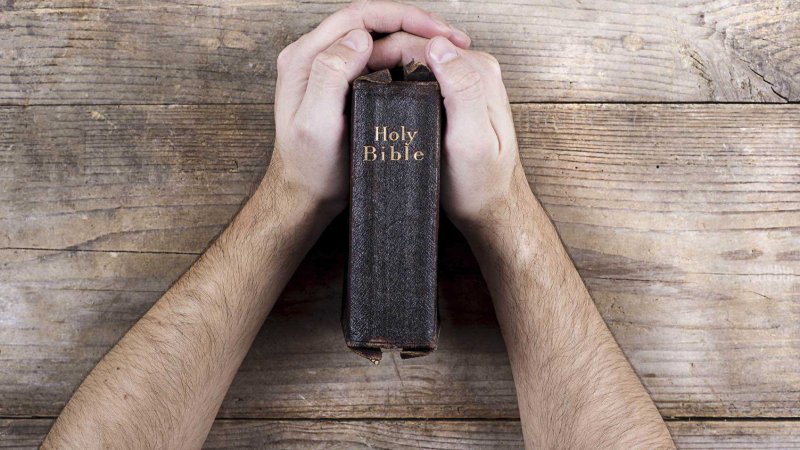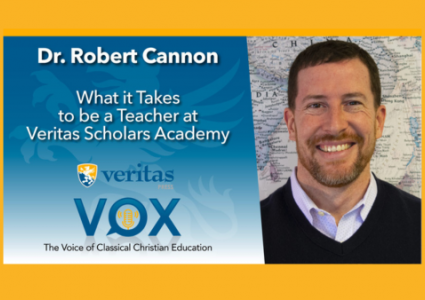The Veritas Approach to Bible

Looking over the homeschool marketplace, I would make two observations.
- It is dominated by Christians.
- Based on the money they spend on curriculum, they don’t value learning the Bible b.
So, I asked some pastors and Christian leaders, “Why is it important for children to learn the content of the Bible?” This is not an attempt to be flippant or trite; I’m really concerned. Many parents don’t teach the content of the Bible to their children.
How would you answer?
Homeschool families will invest considerable sums on grammar, history, Latin, literature, and math while they invest very little in learning the Bible. That would be OK if they spent considerable time studying God’s Word—even without a financial investment. Unfortunately, all too often, they respond this way: “We integrate biblical thinking into all we study” or “We have our Bible education as a devotional time that includes the whole family.” Both of those approaches are good, but neither is enough.
The approach of classical Christian education has us learn a subject's content—the facts—and then how that content relates to other content. Finally, having mastered the facts and how they relate, students learn to be influencers with what they’ve learned.
Applied to the Bible, we would never start teaching apologetics or systematic theology to a kindergartener. They have other things to learn first. The problem might be that we don’t value a strategic approach like classical pedagogy offers when it comes to God’s Word. Maybe we should.
How should our children learn the Bible? Just like the way many classical educators approach teaching history. Start with who, what, where and when—the grammar stage. Then get into how one thing relates to another. These are “how and why” questions. Questions like “How does the Old Testament relate to the New?” and “Why did God destroy everyone but Noah and his family?” and “Why did John the Baptist decrease in his ministry after he baptized Jesus?” are not questions for the younger student. These are too hard, and students need to be made ready for them.
But questions like “What were the 12 tribes of Israel?” or “What is the Scripture reference for the ‘Sermon on the Mount’?” are both important and timely for young children. Knowing the who, what, where, and when is more than fun. It’s crucial. Thy word have I hid in mine heart, that I might not sin against thee. (Psalms 119:11)
If you want your kids to dig deeper into God's Word, check out VeritasBible. A FREE trial awaits you. And you won’t believe what your children (and you) will learn.
For detailed information about Grammar School Bible: K – 6th Grades read on.
How well do your children know the stories of Noah, Nehemiah, Esther, Jacob, Paul, and Peter? Do they know them better than Mickey Mouse or SpongeBob SquarePants? Can they name the Twelve Tribes of Israel? Veritas Bible students can. Imagine a 7-year-old rattling off the Twelve Tribes as easily as naming the four Gospels. When was the Exodus? When did Solomon live? The importance of knowing the biblical stories and when they happened can’t be overstated.
When we started our venture in classical education in 1992, we did it to raise the bar of K–12 education. We did it for our children and for yours. We now have another, more focused concern—biblical illiteracy in Christian families. We didn’t want children to see the events of Scripture isolated from history. We wanted knowledge of history and knowledge of the Bible to be integrated. When reading the story of Joseph, students should know that he lived just prior to the Hyksos’ invasion of Egypt. When reading about Jesus’ early life, students should understand the Roman world into which He was born.
The Veritas Bible program that begins in 2nd grade coincides neatly with the Veritas History that also begins in 2ndgrade. It integrates with the first two series of Veritas History: Old Testament and Ancient Egypt and New Testament, Greece, and Rome. Children can see how the various timelines fit together. Like Veritas History, Veritas Bible is a five-year program, 2nd–6thgrades. Each year covers 32 events, 160 events in all.
Before they start studying the Bible from the beginning, we introduce them to the biblical narrative in kindergarten and 1st grade. This jump start has given them a great starting point for the detail they learn.
Grade | Bible Course | Overlap with History |
K | Old Testament Overview | NA |
1st | New Testament Overview | NA |
2nd | Genesis to Joshua | Old Testament and Ancient Egypt |
3rd | Judges to Kings | Old Testament and Ancient Egypt |
4th | Chronicles to Malachi | Old Testament and Ancient Egypt |
5th | The Gospels | New Testament, Greece, and Rome |
6th | Acts to Revelation | New Testament, Greece, and Rome |
In the grammar stage, we help children memorize all this information so they can access it throughout their lives. For each of the 160 events, they memorize a date and a Scripture reference so they can find it in the Bible. Memorization isn’t enough, though. We want to bring the word to life so that children embrace what they are learning. God uses stories to tell us about our history and the world He created. We do the same thing in our Bible program.
Before beginning Veritas Bible’s five-year program, children go through two biblical surveys: the Old Testament in Kindergarten and the New Testament in 1st grade. This abbreviated telling of the story of God’s word is perfect for their age and prepares them for the depth of study to follow.
Join us in rebuilding a biblically literate generation.






